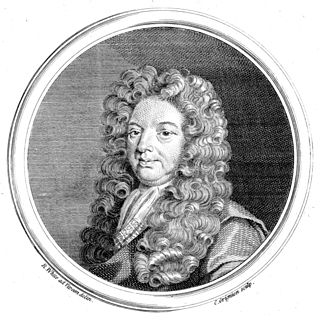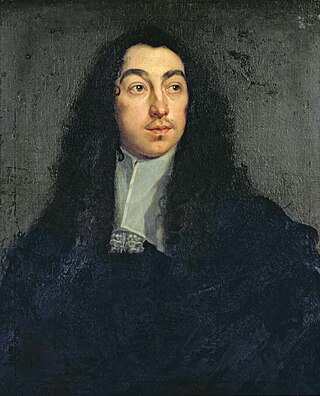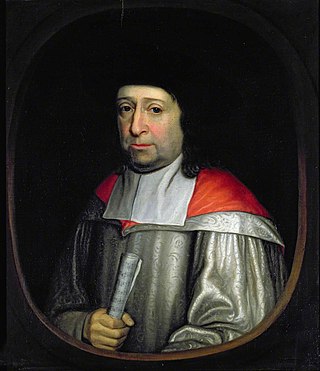Related Research Articles

Henry Purcell was an English composer of Baroque music.

John Blow was an English composer and organist of the Baroque period. Appointed organist of Westminster Abbey in late 1668, his pupils included William Croft, Jeremiah Clarke and Henry Purcell. In 1685 he was named a private musician to James II. His only stage composition, Venus and Adonis, is thought to have influenced Henry Purcell's later opera Dido and Aeneas. In 1687, he became choirmaster at St Paul's Cathedral, where many of his pieces were performed. In 1699 he was appointed to the newly created post of Composer to the Chapel Royal.

William Boyce was an English composer and organist. Like Beethoven later on, he became deaf but continued to compose. He knew Handel, Arne, Gluck, Bach, Abel, and a very young Mozart, all of whom respected his work.
Jeremiah Clarke was an English baroque composer and organist, best known for his Trumpet Voluntary, a popular piece often played at wedding ceremonies or commencement ceremonies.
The year 1706 in music involved some significant events.

Matthew Locke was an English Baroque composer and music theorist.
The year 1699 in music involved some significant events.
The year 1696 in music involved some significant events.
The year 1694 in music involved some significant events.
The year 1692 in music involved some significant events.
The year 1688 in music involved some significant events.
The year 1687 in music involved some significant events.
The following events in the field of music occurred in the year 1683.
The year 1678 in music involved some significant events.
Hail! Bright Cecilia (Z.328), also known as Ode to St. Cecilia, was composed by Henry Purcell to a text by the Irishman Nicholas Brady in 1692 in honour of the feast day of Saint Cecilia, patron saint of musicians.
The decade of the 1530s in music involved some significant events, publications, compositions, births, and deaths.

Christopher Gibbons was an English composer and organist of the Baroque period. He was the second son, and first surviving child of the composer Orlando Gibbons.
April Rosemary Cantelo is an English soprano.

"Remember not, Lord, our offences", Z.50, is a five-part choral anthem by the English baroque composer Henry Purcell (1659–95). The anthem is a setting of a passage from the litany compiled by Thomas Cranmer, Archbishop of Canterbury, and later included in the Anglican Book of Common Prayer. It was composed circa 1679–82 at the beginning of Purcell's tenure as Organist and Master of the Choristers for Westminster Abbey.
Francis Pigott was an English Baroque composer and organist.
References
- ↑ "A New SONG, Call'd The Batchellor's Anſwer TO THE Helpleſs Maiden". English Broadside Ballad Archive. Retrieved 28 January 2019.
- ↑ Pepys Library (Cambridge) (1978). Catalogue of the Pepys Library at Magdalene College, Cambridge. Boydell & Brewer. p. 360. ISBN 978-0-85991-315-7.
- ↑ William Henry Husk (1857). An Account of the Musical Celebrations on St. Cecilia's Day: In the Sixteenth, Seventeenth and Eighteenth Centuries. To which is Appended a Collection of Odes on St. Cecilia's Day. Bell and Daldy. p. 159.
- ↑ David Mason Greene (1985). Greene's Biographical Encyclopedia of Composers. Reproducing Piano Roll Fnd. p. 148. ISBN 978-0-385-14278-6.